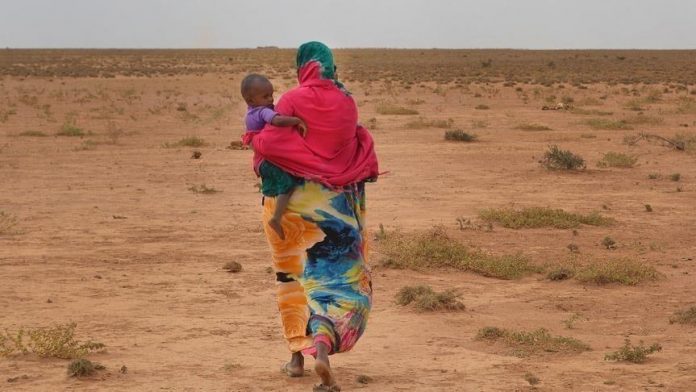Bordering Ethiopia and Kenya, Gedo region in southern Somalia has been critically impacted by severe drought, which is currently affecting more than half of Somalia’s population, in 66 of the country’s 74 districts. The drought is similarly impacting neighbouring communities in Kenya and Ethiopia.
Due to its border location, Dolow town in Gedo has received 2,100 newly arrived internally displaced people (IDPs) from nearby communities, neighbouring Bay and Bakool regions, returnees from Kenya and refugees from Ethiopia. Many arrive with almost nothing, unable to afford water, food, shelter or basic supplies.
Fatima Ibrahim Mohamed is a 56-year-old mother has fled hundreds of kilometres in search of assistance; after her 150 goats and 20 camels died due to lack of water and pasture – a problem affecting much of the country.
Fatima moved with eight other members of her family, and settled in Kaharey village, four kilometres south of Dolow town. A single mother of eight, four boys and four girls, she is the only breadwinner for her family. She collects firewood every day, bringing it to Dolow to sell it and earn an income, but it is not enough to sustain her family’s basic needs.
In December, Fatima was one of the selected beneficiaries to receive shock-responsive cash transfers in response to the drought. This assistance is intended to provide flexible support for people in crisis, allowing them to purchase household goods, such as food, water and other essential items like shelter, healthcare or clothing.
“I received USD210 cash assistance to cope with the current drought,” says Fatima. “The drought has severely affected us, we lost everything but with this assistance, we were given a choice: now I am able to meet my family’s basic needs. I can buy food and water for my family.”
The Somali Cash Consortium implementing partner in the region, the Norwegian Refugee Council (NRC), is focusing on supporting people most affected, including Fatima.
Paid via mobile money, her one-off cash transfer will provide three months of assistance to mitigate the drought’s impact on her and her family.
“Cash transfers are an effective and rapid tool to help those in need,” says NRC’s Mohamed Bashir Sheikh, Livelihoods and Food Security Officer in Jubaland. “In this case, it means people can prioritise their needs, like medicine for a family member, or food for a family, receive assistance with dignity, and support the local market.”
The support is part of the SAGAL Social Transfer programme implemented by the Ministry of Labour and Social Affairs and the Somali Cash Consortium, funded by the European Union. The shock responsive social transfer activity is a successful case in which developmental and humanitarian donors joined forces to support the most in-need in Somalia.
Source Relief Web

